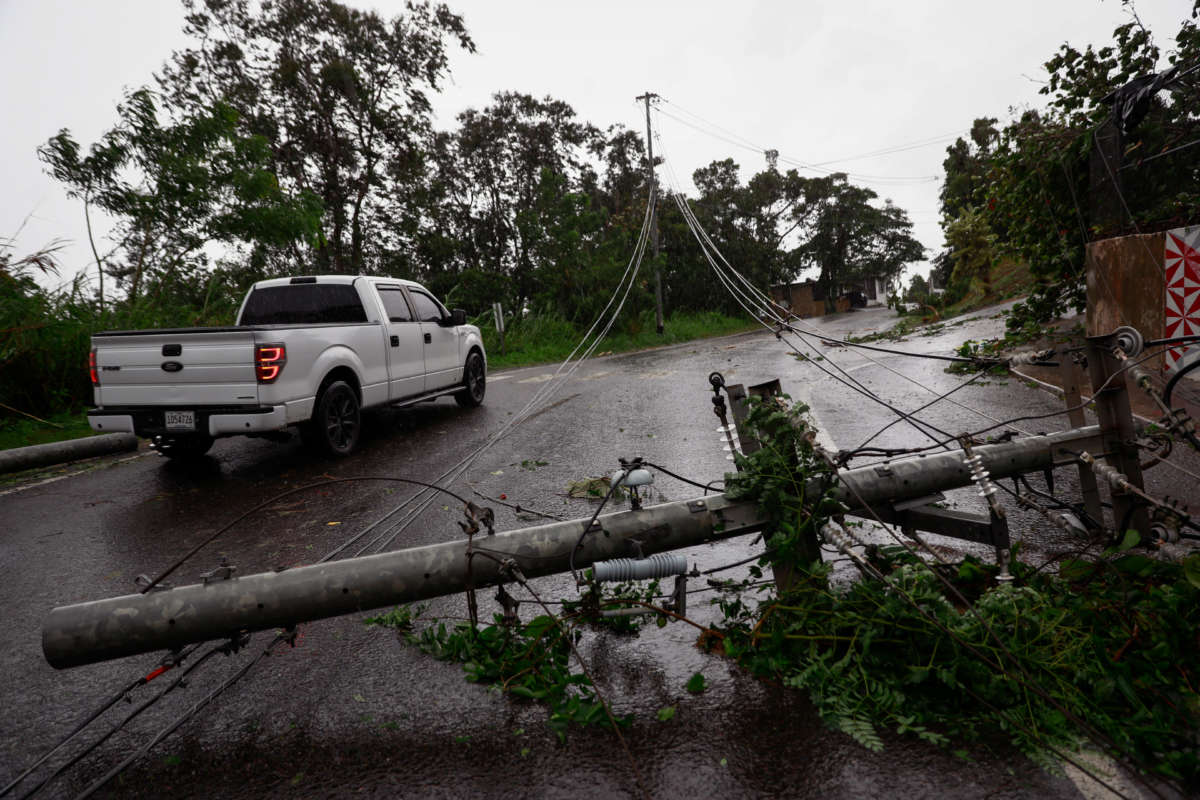The entirety of Puerto Rico lost power on Sunday, leaving the island’s over 3 million people in the dark before the Category 1 Hurricane Fiona that was forecasted to dump at least over a foot and up to 30 inches of rain on the island.
Over 1.4 million customers tracked by Luma Energy, which owns the transmission and distribution of power in Puerto Rico, lost power. This includes places like health centers, where many people rely on electricity to survive. According to PowerOutage.us, the vast majority of buildings and residences are still without power as of Monday morning, with over 1.3 million customers currently in a blackout.
The hurricane, which experts say was likely made worse by the climate crisis, has now largely passed Puerto Rico, leaving landslides and flooding in its wake, destruction that Puerto Rico Gov. Pedro Pierluisi called “catastrophic.” The storm also ripped the roofs off of homes and took down a bridge in the town of Utuado in central Puerto Rico.
Large portions of the island have also been left without safe drinking water in the wake of the storm. Officials have confirmed at least one death caused by the storm so far.
President Joe Biden declared a state of emergency for the island on Sunday, freeing up Federal Emergency Management Agency (FEMA) funding and resources to coordinate a response to the storm.
Luma says that high speed winds and otherwise poor conditions disrupted power lines, leading to the blackout. The company says that it could take several days for power to be fully restored.
The storm hit five years after Hurricane Maria, the worst-ever hurricane to hit the U.S. territory, also knocked out all power on the island. The island’s now-privately owned power grid never recovered from that storm — the grid is now constantly plagued by power outages and brownouts, and residents and energy analysts note that electricity can be knocked out for hundreds of thousands of customers if there’s even a mild storm.
Maria’s devastation highlighted deep-rooted issues with the island’s electrical grid. It took nearly an entire year for power to be fully restored to the island’s customers — if it can be categorized as such with constant blackouts and brownouts. The government agency that managed the electricity system at the time was dealing with a shrinking workforce, billions in debt and corruption within its ranks.
The hurricane paved the way for Luma to take over the transmission and distribution of power on the island from the agency, known as Puerto Rico Electric Power Authority (PREPA), with the goal of revitalizing the grid and making it more reliable. But experts noted when officials drew up plans for the transfer in 2018 that privatization would not help heal the island’s grid — and, as previous privatization schemes for water utilities on the island showed, it could make the situation worse.
Indeed, some Puerto Ricans say that the blackouts and brownouts have remained unchanged or even worsened since Luma took over grid management last year, while customers are now paying double the rate for electricity that they were paying before the takeover. These reliability issues also come as the island’s grid is almost entirely powered by fossil fuel sources, not only contributing to the climate crisis but also majorly driving prices up, according to one analysis by the Institute for Energy Economics and Financial Analysis.
On top of that, thousands of unionized workers who worked for PREPA lost their jobs or were transferred to other departments when Luma took over; while many were offered jobs with Luma, they declined because they would have lost benefits like pensions, according to the union.
Because of these issues, Puerto Ricans have waged protests against Luma, asking for the government to end its contract with the company.
Join us in defending the truth before it’s too late
The future of independent journalism is uncertain, and the consequences of losing it are too grave to ignore. To ensure Truthout remains safe, strong, and free, we need to raise $43,000 in the next 6 days. Every dollar raised goes directly toward the costs of producing news you can trust.
Please give what you can — because by supporting us with a tax-deductible donation, you’re not just preserving a source of news, you’re helping to safeguard what’s left of our democracy.
